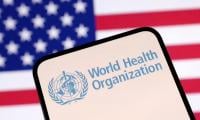Stuck in a swamp: hard times for South Sudan’s war displaced
NYAL, South Sudan: The world’s biggest marshland has shielded the people of Nyal from the carnage of South Sudan’s civil war, but now hunger and illness are taking the toll that violence has not.Isolation is both a blessing and a curse. In the surrounding Panyijar County some 60,000 people have
By our correspondents
March 06, 2015
NYAL, South Sudan: The world’s biggest marshland has shielded the people of Nyal from the carnage of South Sudan’s civil war, but now hunger and illness are taking the toll that violence has not.
Isolation is both a blessing and a curse. In the surrounding Panyijar County some 60,000 people have been left almost entirely dependent on supplies dropped from the sky by the World Food Programme (WFP), part of a multi-million dollar aid operation keeping the world’s youngest nation, and now its newest failed state, from falling into all-out famine.
“It was difficult before the war, but people at least had access to the market and Juba, the capital,” explained Nyalam Joak, a local woman waiting with her two-year-old child outside the county’s only medical facility, a small clinic run by a German charity, Sign of Hope.
“But since the war started we can rely only on UN food,” she said.
Fighting broke out in South Sudan in December 2013, when President Salva Kiir accused his sacked deputy Riek Machar of attempting a coup. Since then the impoverished nation has been carved up along tribal lines in a war marked by widespread atrocities including child soldier recruitment, gang rape and massacres.
Months of slow-moving peace talks held in luxury hotels in the Ethiopian capital Addis Ababa have failed to deliver. Successive ceasefire agreements between Kiir’s government and Machar’s rebels have quickly collapsed, sometimes within hours.
Nyal is under rebel control and cut off from the capital and its usual sources of food and medicines. The rebels have accused the government of blockading areas under their control.
In the market, stalls are virtually empty: “Business is bad. All the roads are blocked by insecurity and people do not have money,” said James Gadiang, a 36-year-old trader selling his sparse stock of tea bags, soft drinks, soap and cigarettes.
“The food situation is very severe, and malnutrition is increasing,” said Mineab Sebhatu, a doctor and medical coordinator for Sign of Hope. “The only food they’re getting is from organisations.”
“We’re in a swampy area. Malaria is high. We also have respiratory diseases, schistosomiasis, brucellosis, typhoid,” he said, counting off the many sicknesses that afflict local people who are more susceptible when malnourished.
Sebhatu said the clinic treated 58,000 patients last year, more than double the number in 2013, before the war began.
In front of the clinic, Mary Nyachak struggles to breastfeed her six-month-old son Malat.
“I do not produce enough milk, because I don’t have enough food,” she said.
“The last UN food I received was in October, but it has been finished a long time ago,” she said. “People are surviving by eating waterlily and guan roots,” another plant found in the swamps.
Fighting in and around the towns of Bentiu and Mayom in the oil fields to the north of Nyal triggered an exodus and many of those who fled have found refuge in the remote swamps, swelling an already-dependent local population.
Many have chosen safety over comfort, isolating themselves in the tall reeds and on the small islands that dot the marshlands.
“I lived in Mayom. When the war broke out we moved to this island, because we feared for our lives. Mayom was burned down, we did not have anywhere to stay,” said Mary Nyayena.
Surrounded by ragged children with swollen bellies, Nyayena and a neighbour were peeling the roots of water lilies which they grind by hand and mix with water to make an unsatisfying gruel that has been their daily meal, once a day, for the past year.
Nyayena has no nets to fish, and the food drops do not reach the islands. “Life here is very difficult,” she said.
Nor did she hold out any hope of an improvement anytime soon. “Peace is still not coming,” Nyayena said, “and maybe bad things will happen again.”
Isolation is both a blessing and a curse. In the surrounding Panyijar County some 60,000 people have been left almost entirely dependent on supplies dropped from the sky by the World Food Programme (WFP), part of a multi-million dollar aid operation keeping the world’s youngest nation, and now its newest failed state, from falling into all-out famine.
“It was difficult before the war, but people at least had access to the market and Juba, the capital,” explained Nyalam Joak, a local woman waiting with her two-year-old child outside the county’s only medical facility, a small clinic run by a German charity, Sign of Hope.
“But since the war started we can rely only on UN food,” she said.
Fighting broke out in South Sudan in December 2013, when President Salva Kiir accused his sacked deputy Riek Machar of attempting a coup. Since then the impoverished nation has been carved up along tribal lines in a war marked by widespread atrocities including child soldier recruitment, gang rape and massacres.
Months of slow-moving peace talks held in luxury hotels in the Ethiopian capital Addis Ababa have failed to deliver. Successive ceasefire agreements between Kiir’s government and Machar’s rebels have quickly collapsed, sometimes within hours.
Nyal is under rebel control and cut off from the capital and its usual sources of food and medicines. The rebels have accused the government of blockading areas under their control.
In the market, stalls are virtually empty: “Business is bad. All the roads are blocked by insecurity and people do not have money,” said James Gadiang, a 36-year-old trader selling his sparse stock of tea bags, soft drinks, soap and cigarettes.
“The food situation is very severe, and malnutrition is increasing,” said Mineab Sebhatu, a doctor and medical coordinator for Sign of Hope. “The only food they’re getting is from organisations.”
“We’re in a swampy area. Malaria is high. We also have respiratory diseases, schistosomiasis, brucellosis, typhoid,” he said, counting off the many sicknesses that afflict local people who are more susceptible when malnourished.
Sebhatu said the clinic treated 58,000 patients last year, more than double the number in 2013, before the war began.
In front of the clinic, Mary Nyachak struggles to breastfeed her six-month-old son Malat.
“I do not produce enough milk, because I don’t have enough food,” she said.
“The last UN food I received was in October, but it has been finished a long time ago,” she said. “People are surviving by eating waterlily and guan roots,” another plant found in the swamps.
Fighting in and around the towns of Bentiu and Mayom in the oil fields to the north of Nyal triggered an exodus and many of those who fled have found refuge in the remote swamps, swelling an already-dependent local population.
Many have chosen safety over comfort, isolating themselves in the tall reeds and on the small islands that dot the marshlands.
“I lived in Mayom. When the war broke out we moved to this island, because we feared for our lives. Mayom was burned down, we did not have anywhere to stay,” said Mary Nyayena.
Surrounded by ragged children with swollen bellies, Nyayena and a neighbour were peeling the roots of water lilies which they grind by hand and mix with water to make an unsatisfying gruel that has been their daily meal, once a day, for the past year.
Nyayena has no nets to fish, and the food drops do not reach the islands. “Life here is very difficult,” she said.
Nor did she hold out any hope of an improvement anytime soon. “Peace is still not coming,” Nyayena said, “and maybe bad things will happen again.”
-
 US To Exit WHO: A Seismic Shift In Global Health?
US To Exit WHO: A Seismic Shift In Global Health? -
 Palace Staff Reveals Nothing Has Changed For ‘disgraced’ Andrew After Losing Titles
Palace Staff Reveals Nothing Has Changed For ‘disgraced’ Andrew After Losing Titles -
 How Did Taylor Swift Cope With ‘exhausting’ Sickness During Popular ‘Eras Tour’
How Did Taylor Swift Cope With ‘exhausting’ Sickness During Popular ‘Eras Tour’ -
 Artists Launch ‘Stealing Isn’t Innovation’ Campaign Against AI Use
Artists Launch ‘Stealing Isn’t Innovation’ Campaign Against AI Use -
 Elon Musk’s XAI Grok Imagine Now Generates 10-second Videos With Sharper Quality: Here’s How
Elon Musk’s XAI Grok Imagine Now Generates 10-second Videos With Sharper Quality: Here’s How -
 Gaten Matarazzo Reveals Having A Gripe About Unfair Treatment On 'Stranger Things'
Gaten Matarazzo Reveals Having A Gripe About Unfair Treatment On 'Stranger Things' -
 Jeff Bezos Vs Elon Musk: Blue Origin Enters Satellite Race To Rival Starlink
Jeff Bezos Vs Elon Musk: Blue Origin Enters Satellite Race To Rival Starlink -
 Charlie Puth Explains Why He Went Against His Own Words About 'Hero'
Charlie Puth Explains Why He Went Against His Own Words About 'Hero' -
 Popular Weight-loss Drugs Could Help Treat Addiction
Popular Weight-loss Drugs Could Help Treat Addiction -
 Brooklyn Beckham In ‘terrible Spot’ Like Prince Harry After Airing Family Drama
Brooklyn Beckham In ‘terrible Spot’ Like Prince Harry After Airing Family Drama -
 A$AP Rocky Reveals Real Reason Behind Feud With Drake
A$AP Rocky Reveals Real Reason Behind Feud With Drake -
 Stroke During Pregnancy Linked To Long-term Heart Problems
Stroke During Pregnancy Linked To Long-term Heart Problems -
 Trump Backs Off European Tariffs Threat After Reaching ‘framework Of A Future Deal’ On Greenland With NATO
Trump Backs Off European Tariffs Threat After Reaching ‘framework Of A Future Deal’ On Greenland With NATO -
 South Korea Passes World’s First Comprehensive AI Law, Reshaping Global Regulation
South Korea Passes World’s First Comprehensive AI Law, Reshaping Global Regulation -
 ‘Disgraced’ Andrew’s New Demands Exposed As He Moves Out Of Royal Lodge
‘Disgraced’ Andrew’s New Demands Exposed As He Moves Out Of Royal Lodge -
 Court Allows TikTok To Operate In Canada Pending Review
Court Allows TikTok To Operate In Canada Pending Review



